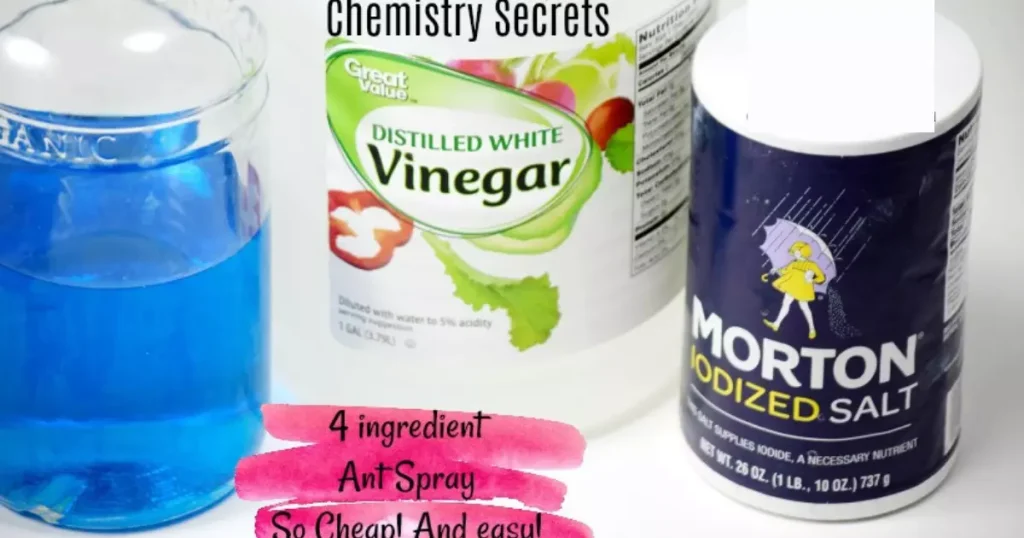Ants are industrious insects that can quickly become unwelcome guests in our homes. While store-bought ant killers are readily available, homemade ant killer solutions offer a natural and cost-effective alternative. In this guide, we’ll explore various methods and ingredients to create powerful ant repellents using common household items.
Table of Contents
Understanding the Ant Menace
Before diving into the world of DIY ant killers, let’s take a moment to understand the reasons behind these tiny invaders making their way into our living spaces. Ants are attracted to food sources, especially sugary substances and crumbs. They leave behind chemical trails, enabling their fellow ants to follow the scent and locate the food.
The Natural Arsenal: Ingredients for Homemade Ant Killer
1. White Vinegar
White vinegar is a versatile household item with myriad uses, including pest control. Its strong scent disrupts ant trails and erases the chemical pheromone markers they use to communicate. Combine white vinegar with water in a 1:1 ratio and spray it along ant pathways, entry points, and nesting areas.
2. Borax
Borax, a natural mineral, is a potent ant killer. It disrupts their digestive system and is often used in commercial ant baits. Create a solution of borax and sugar by mixing equal parts. The sugar attracts the ants, and the borax does the lethal work. Place small amounts of this mixture near ant activity sites.
3. Lemon
Lemon, with its citrusy aroma, is another effective ant deterrent. Squeeze fresh lemon juice and mix it with an equal amount of water. Wipe down surfaces and areas where ants frequent. The scent will repel them, and the acidity disrupts their scent trails.
4. Peppermint Essential Oil
Ants despise the smell of peppermint. Mix a few drops of peppermint essential oil with water and spray it in areas prone to ant infestations. This not only serves as an ant repellent but also leaves your home smelling fresh.
Crafting Your Homemade Ant Killer Arsenal
Now that we’ve identified our weapons of choice let’s explore how to use them strategically to combat ant invasions.
1. Identify Entry Points and Ant Trails
Begin by locating the entry points and ant trails. Follow their movements to understand their pathways and nesting spots. This step is crucial for effective placement of your homemade ant killer solutions.
2. Prepare White Vinegar Spray
In a spray bottle, mix equal parts white vinegar and water. Shake the bottle well to ensure thorough mixing. Now, generously spray this solution along ant trails, entry points, and near their nests. Repeat this process regularly to disrupt their pheromone trails.
Anecdote: Sarah, a homeowner battling persistent ant invasions, was amazed at how the simple solution of white vinegar changed the game. The ants that once roamed freely were now on a detour away from her kitchen.
3. Deploy Borax and Sugar Mixture
Create a mixture of equal parts borax and sugar. Place small amounts of this mixture near ant activity sites. Be cautious with the placement, especially if you have pets or small children. The sugar acts as bait, attracting the ants to the deadly borax.
Anecdote: James, a DIY enthusiast, discovered the effectiveness of borax when he noticed a significant reduction in ant numbers within days. His kitchen was finally ant-free, thanks to this simple yet powerful homemade remedy.
4. Lemon Wipe Down
Squeeze fresh lemon juice and mix it with an equal amount of water. Use this mixture to wipe down surfaces, countertops, and areas where ants are prevalent. The citrus scent not only deters ants but also leaves your home smelling fresh and clean.
Anecdote: Maria, a homemaker, stumbled upon the lemon solution while trying to find a natural way to keep ants away from her pantry. The refreshing scent of lemons became a bonus in her quest for an ant-free kitchen.
5. Peppermint Power Spray
In a spray bottle, mix a few drops of peppermint essential oil with water. Spray this solution in areas where ants are commonly seen. Focus on entry points, windowsills, and baseboards. The strong aroma of peppermint will discourage ants from entering your living spaces.
Anecdote: John, an advocate for eco-friendly living, found solace in using peppermint essential oil. Not only did it repel ants effectively, but it also aligned with his commitment to using natural solutions in his home.
Conclusion: Embracing the Power of Homemade Ant Killer
In the battle against ants, homemade ant killers emerge as powerful allies. The use of white vinegar, borax and sugar mixtures, lemon solutions, and peppermint essential oil can transform your home into an ant-free zone. These DIY remedies not only save you money but also contribute to a safer and chemical-free living environment.
Frequently Asked Questions (FAQs) related to homemade ant killers:
What makes white vinegar an effective ant repellent?
White vinegar disrupts ant trails and erases their pheromone markers. The strong scent masks the trails, making it difficult for ants to navigate, and it’s a safe and natural alternative to chemical ant repellents.
Is borax safe to use as an ant killer in homes with pets?
While borax is generally considered safe when used in small quantities, it can be toxic to pets if ingested in large amounts. To ensure safety, place borax and sugar mixtures in areas inaccessible to pets, or consider alternative pet-friendly ant deterrents.
How often should I apply homemade ant killer solutions for optimal results?
The frequency of application depends on the severity of the ant infestation. In general, it’s recommended to apply homemade ant killers regularly, especially along ant trails and entry points. Consistency is key to disrupting and deterring ant activity.
Can I use peppermint essential oil directly on surfaces to repel ants?
While peppermint essential oil is a potent ant repellent, using it directly on surfaces may leave an oily residue. It’s advisable to mix a few drops of peppermint essential oil with water in a spray bottle and apply the solution to surfaces, ensuring a more even distribution without residue.
Are there specific precautions to take when using homemade ant killers around food preparation areas?
Yes, it’s essential to be cautious when using homemade ant killers in areas where food is prepared. Wipe down surfaces with lemon solutions or vinegar sprays, ensuring they are food-safe. Place borax and sugar mixtures strategically, away from direct contact with food items, to prevent contamination.










